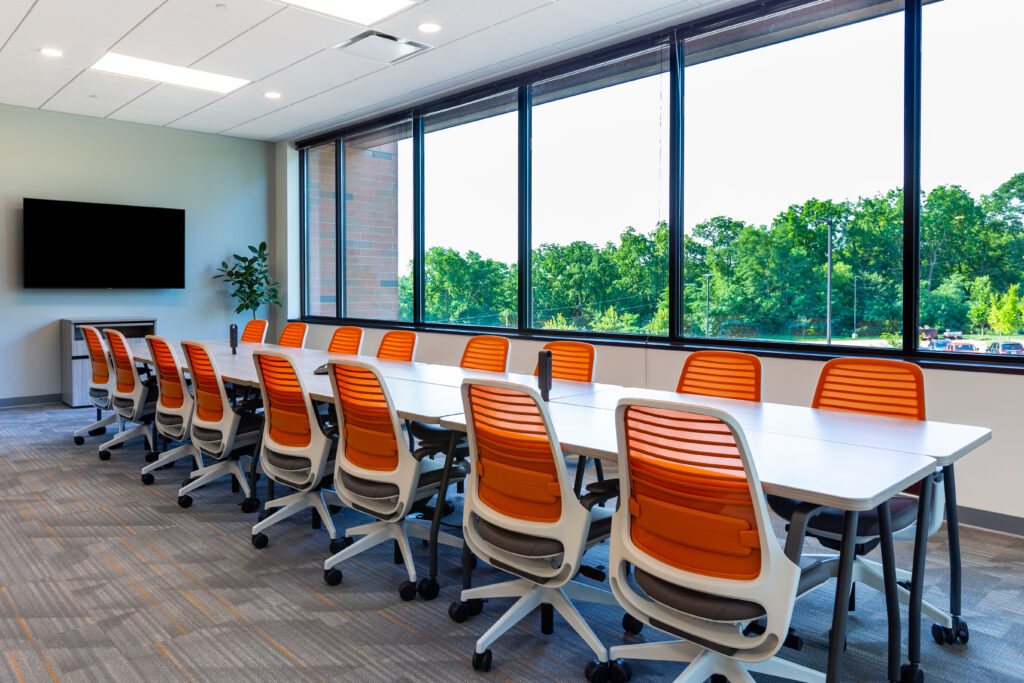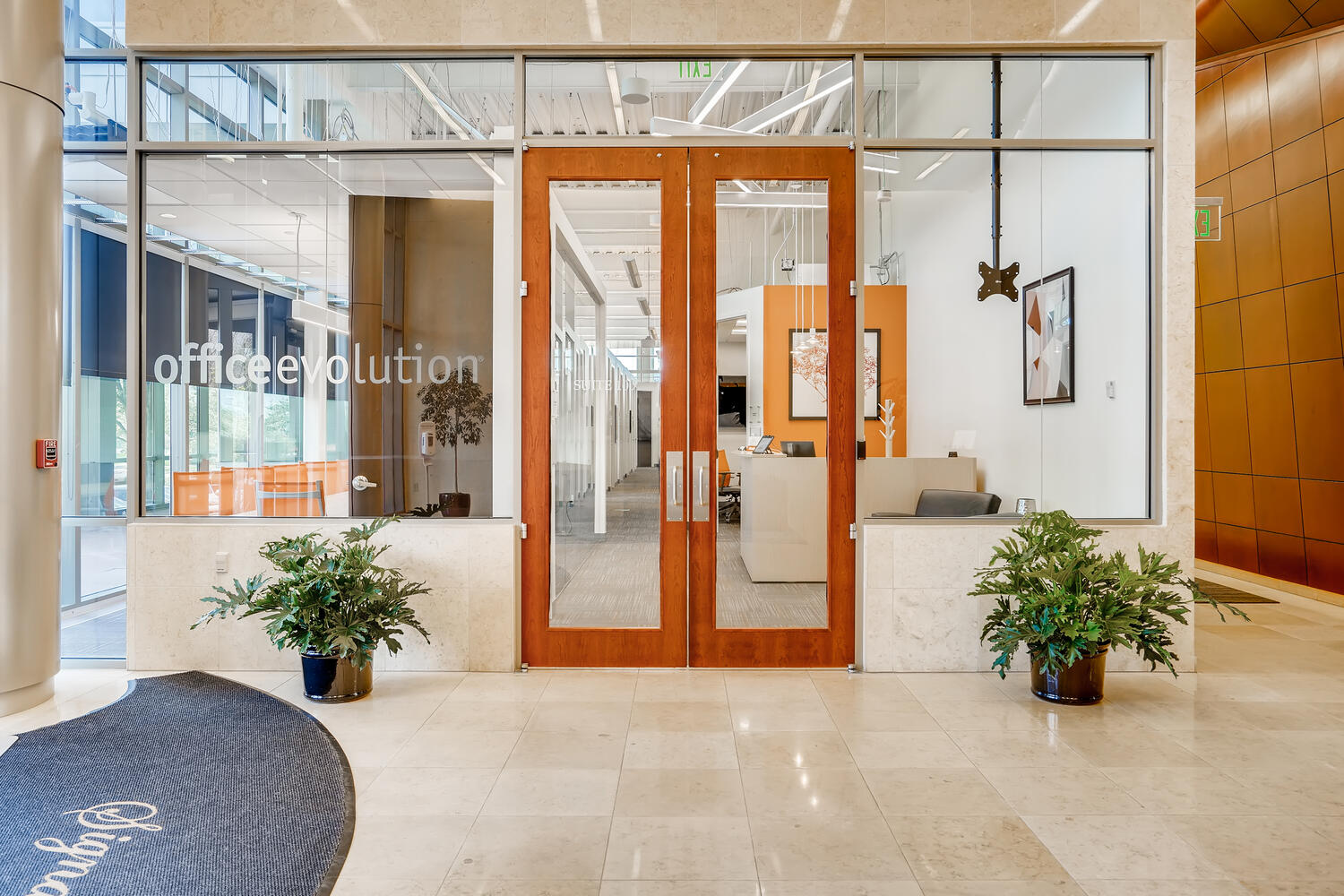The Rise of Coworking Spaces
Coworking spaces are shared work environments for independent professionals, remote workers, and small business owners. Unlike a traditional office, a coworking space franchise consists of an open workspace that members can use on-demand, meeting rooms, event space, and other amenities.
The coworking space industry has continued to grow significantly since 2019. As of 2023, there are about 35,000 coworking spaces globally. This increase is partly due to the remote work trend, which has seen a 44% increase in the past five years. The coworking industry is expected to expand further, with projections indicating a rise to 41,975 coworking spaces worldwide by the end of 2024.”
Coworking spaces are not just increasing in number; they are also proving beneficial for those who use them. About 83% of coworking space members reported feeling less lonely, and 82% have expanded their professional networks since joining these spaces. Additionally, 69% of people using coworking spaces report higher productivity.
Financially, the coworking space market is also showing positive trends. This profitability is a notable recovery from the impacts of the COVID-19 pandemic, which had caused a significant decline in the market. The global coworking space market, valued at $9.27 billion in 2019 and $8.24 billion in 2020, is predicted to reach $11.52 billion in 2023. “
Regarding demographics, the average age of coworking space users worldwide is 36 years, with a diverse range of professions represented, including the IT industry, consulting, public relations, marketing, and design. The IT industry, in particular, accounts for 20% of coworking space members.”
These statistics and trends highlight the coworking space industry’s dynamic growth and evolving landscape, demonstrating its resilience and adaptability in the face of changing work patterns and economic challenges. This exponential growth demonstrates the strong demand for flexible, collaborative workspaces as an alternative to traditional offices or working from home alone.
Coworking offers numerous benefits compared to leasing a private office. The flexible terms and ability to scale up or down each month provide financial savings and suit the needs of solopreneurs, startups, gig economy workers, and remote teams. Coworking spaces foster networking, idea sharing, and mentorship through community events and the diversity of members. The turnkey amenities like WiFi, printing, conference rooms, and office equipment allow members to focus on their work rather than operational tasks. Coworking can also enhance work-life balance by separating work and home environments.
Blending Work and Leisure
Coworking spaces are designed to blend work and leisure seamlessly. Rather than being focused solely on desk space and meeting rooms, most coworking facilities incorporate a variety of amenities and leisure facilities.
A coworking cafe provides members an onsite place to grab coffee, snacks, and meals without leaving the office—lounges with comfortable seating foster social interaction and focused work. Game rooms allow members to decompress with ping pong, foosball, arcade games, or VR experiences. Coworking spaces also host frequent events and activities to facilitate networking and community building. Social events like trivia nights, cookouts, yoga classes, paint nights, and live music performances allow members to interact and build relationships. Professional development workshops, “lunch and learn” sessions with guest speakers, and skill-building classes allow members to continue learning and growing.
The blend of work and leisure spaces and programming found in most coworking facilities enhances work-life balance by allowing members to take breaks, build professional networks, and recharge without wasting time commuting elsewhere. The mix of shared workspaces and leisure areas facilitates both productivity and connections.

Enhancing Work-Life Balance
Coworking spaces are designed to promote work-life balance and help prevent burnout. The open, collaborative environment allows workers to take breaks, change their scenery, and recharge when needed.
Unlike a traditional office, coworking spaces don’t require employees to stay chained to their desks all day. The community-oriented philosophy encourages chatting with colleagues in the lounge, getting a snack in the kitchen, or playing a quick game in the recreation room. These micro-breaks provide mental refreshment and boost energy and focus when returning to work.
Having intermixed leisure facilities with workspaces makes it easy for people to shift between work and rest modes. Taking a short walk down the hall to decompress during stressful times can do wonders for productivity throughout a workday. It’s much healthier than forcing yourself to stare at a computer screen nonstop.
The variety of work zones also prevents the mental fatigue that can come from sitting in the same spot hour after hour. Coworking members can move between quiet private offices, shared desks, meeting rooms, phone booths, and open lounges. Simply relocating to alternate areas helps people avoid burning out on their tasks.
The seamless integration of work and leisure gives professionals autonomy over their time and attention. Workers can listen to their mind and body to take breaks when needed. This flexibility results in higher job satisfaction, better work-life balance, and protection against fatigue.
Facilitating Collaboration
Coworking spaces are designed to foster collaboration and the cross-pollination of ideas between members. The open layout encourages interactions and conversations that might not otherwise occur in a traditional office setting. Desks and workstations are purposely situated near common spaces to promote spontaneous meetings and networking.
Many coworking spaces also host member mixers, events, hackathons, and programs to facilitate collaboration directly. Members can find others with complementary skill sets for potential partnerships. The diversity of the members also allows for unique perspectives and cross-pollination between industries. For instance, a writer can brainstorm content ideas with a tech founder, while a graphic designer provides input on visuals.
The collaborative community of coworking spaces allows independent workers and small companies to team up on projects that are usually out of reach. It provides connections and talent to get ideas off the ground. Members become part of a tight-knit ecosystem where they can test ideas, find solutions, and create new opportunities through collaboration.
Fostering Community
Coworking spaces provide ample opportunities for networking, collaboration, and forming meaningful connections with other professionals and entrepreneurs. The community aspect sets coworking spaces apart from traditional office environments and coffee shops.
Rather than working in isolation, members have chances for spontaneous interactions and relationship-building throughout the workday. Walking to the kitchen or cafe, chatting before a meeting, or bumping into a fellow member can lead to valuable personal and professional relationships.
Coworking owners often facilitate community building by organizing social events, speaker series, mentoring programs, and other activities that unite members. Surrounded by this thriving community, members experience a greater sense of belonging and support. They can learn from each other, exchange ideas and feedback, and discover new opportunities through the people they meet.
The community extends beyond a single coworking space. Global coworking brands connect members to broader learning, partnering, and growth networks. Within this open, welcoming, and collaborative environment, members can build strong personal connections that reduce feelings of isolation and lead to greater fulfillment.
The Coworking Cafe Culture
One of the most popular features of coworking spaces is the cafe area, which allows members to grab a coffee, snack, or meal without ever having to leave the office. The coworking cafe provides a welcoming place to take a break, socialize with other members, and hold informal meetings.
Having an onsite cafe creates opportunities for spur-of-the-moment connections and collaboration. Members can discuss projects and ideas over coffee or brainstorm solutions during a shared meal. Eating together builds camaraderie and facilitates relationship-building between members of different companies.
The cafe atmosphere also cultivates creativity. The ambient chatter and energy of the cafe space get the creative juices flowing. Members can bounce ideas off each other or find inspiration for their work. Whether having a solo coffee break or chatting in a group, the coworking cafe becomes a hub for innovation.
Coworking cafes also host scheduled events like lunch-and-learns, seminars, or mixers. Members can grab food and drinks while learning from guest speakers or networking with other members. The cafe provides a casual setting for educational and social gatherings.
An onsite cafe significantly adds to the member experience at a coworking space. It’s a place to refuel, connect, and collaborate without disrupting the workday. The restaurant may provide the best value-added perk for companies looking to get the most out of their coworking membership.
Recharging Through Recreation
One of the unique aspects of coworking spaces is the integration of leisure and recreational activities into the workspace. Many coworking facilities feature game rooms with pool tables, ping pong, arcade games, and more. These recreational rooms provide the perfect outlet for recharging one’s mental batteries.
Taking a quick break for a game of pool or foosball allows the mind to relax and reset. It is a wonderful way to clear one’s head after intense focus. Rather than being cooped up at a desk all day, coworking spaces encourage movement and activity through these recreation rooms. Taking a short gaming break can boost energy, inspiration, and motivation.
Access to these leisure activities enables members to recharge and destress in minutes. The onsite recreation rooms create opportunities for community building as well. Members often gather for friendly competitions or tournaments. Coworkers can bond and network while enjoying a quick ping-pong match. Whether a solo gaming session or a team activity, the recreation rooms provide a valuable resource for relaxation, stress relief, and relationship development among members.
The coworking model recognizes the importance of balancing work and leisure. Game rooms allow members to take a recreational break and return energized. It shows that productivity is not about the hours logged – it is about working smarter and knowing when to take a breather. The recreational activities offered at coworking spaces demonstrate their commitment to supporting work-life balance and enabling members to thrive.
Wellness Offerings

Many coworking spaces understand that to do your best work, you must take care of your physical and mental well-being. That is why they offer amenities and programming for health and wellness within the coworking environment.
Yoga classes are commonly offered, allowing members to stretch, strengthen, and relax in the coworking lounge or conference room. The convenience of having yoga at work makes it much easier to prioritize self-care during busy workdays.
Meditation sessions are also popular offerings. Whether it is a lunchtime guided meditation or allowing members to use quiet spaces for solo meditation, coworking operators know the value of giving members time for mindfulness. Meditation has been shown to reduce stress, improve focus, and boost creativity.
Some coworking spaces go beyond yoga and meditation to offer a full slate of fitness classes onsite. From high-intensity interval training to pilates, having access to group fitness keeps members active and engaged. It also facilitates community building and networking as members work together.
In addition to classes and sessions, many coworking spaces promote wellness simply through their environment and amenities. Natural light, ergonomic furnishings, air purification systems, and access to healthy snacks and beverages create a workspace optimized for health and productivity.
The wellness offerings in today’s coworking spaces allow busy professionals to maintain physical and mental health while connecting with a like-minded community. Sticking to healthy habits is much easier when your workspace is designed with wellness in mind.
Productivity Enhancement
Coworking spaces help enhance productivity by providing an environment tailored for work, separate from the distractions of home. Staying focused on chores, errands, family members, pets, and other domestic demands constantly competing for your attention can be difficult at home. The casual, relaxed home setting can also make it hard to get into a working mindset.
In a coworking space, you are surrounded by others who are there to work. This fosters a professional, focused environment without the distractions of home. A dedicated workspace helps you mentally shift into work mode during working hours. It establishes a separation between work life and personal life.
Many coworking spaces also offer amenities to boost productivity, like high-speed WiFi, printers, coffee and snacks, and private call rooms. With your professional needs met, you can buckle down and fully immerse yourself in your work. An environment optimized for productivity makes it easier to focus and make headway on projects. You can accomplish more at a coworking space in less time than working from your living room couch.
The Coworking Franchise Model
The coworking franchise model offers entrepreneurs a unique opportunity to capitalize on the booming coworking industry while benefiting from the proven success of an established brand. Office Evolution, founded in 2003, provides end-to-end support, training, and resources to franchise owners seeking to tap into the growing demand for flexible, collaborative workspaces.
As an Office Evolution franchisee, you can leverage the expertise of an executive team with over 35 years of experience in executive suites, coworking spaces, business centers, and shared office markets. Office Evolution’s executive leadership guides franchise owners through site selection, build-out, marketing, operations, and more – providing the playbook for coworking space success.
Franchise owners can count on ongoing training and support in critical areas like membership sales, community management, cafe operations, and profit center development. You’ll join a network of over 70 locations across the United States, with new coworking spaces opening every month in prime markets still ripe for expansion.
If you’re an entrepreneur interested in staking your claim in the thriving coworking sector. Office Evolution offers a proven business model, brand recognition, operational knowledge, and corporate support to help ensure your success and profitability. Join a brand founded on the philosophy of “Workspace That Works for You,” backed by nearly two decades of experience in the flexible workspace industry.
Contact us today, and let’s talk franchising!

